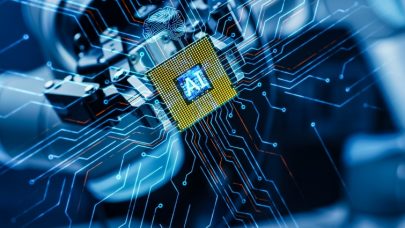Aug. 24, 2022 — Quantum company ColdQuanta recently announced its acquisition of Chicago-based quantum startup Super.tech in a marriage of research complements — ColdQuanta’s hardware capabilities with Super.tech’s software innovations.

The May 2022 announcement was good news for Q-NEXT, a U.S. Department of Energy (DOE) National Quantum Information Science Research Center led by DOE’s Argonne National Laboratory.
By bringing Super.tech into the fold, ColdQuanta, a Q-NEXT partner, can operate with a more software-aware approach to quantum technology, accelerating research in quantum materials and simulations, core research areas for Q-NEXT. And Super.tech, itself a Q-NEXT affiliate, can take its computational programs to the next level by connecting with ColdQuanta’s quantum machines and hardware expertise.
“This is an example of how a startup can identify and fulfill a need in an emerging area of technology and then grow to complement the mission of a more established technology company,” said Q-NEXT Director David Awschalom, who is also an Argonne senior scientist, the Liew Family professor of molecular engineering and vice dean for research and infrastructure at the University of Chicago Pritzker School of Molecular Engineering, and the director of the Chicago Quantum Exchange.
ColdQuanta develops quantum devices and quantum information platforms based on cold-atom technology, in which neutral atoms are chilled to a few millionths of a degree above absolute zero. At that temperature, the atoms can be manipulated as carriers of quantum information, or qubits.
Unlike some other qubit types, which are human-fabricated, cold-atom qubits are nature-made.
“Atoms are really easy-to-understand physical systems. They’re easy to model. And really, the qubit itself is in some sense perfect,” said Tom Noel, ColdQuanta vice president for quantum computing. “You’re using this really nice, nature-provided qubit. So it takes the problem of making a nice qubit completely out of the hands of the experimenter.”
The major limiting factor lies not in the design of the qubit itself but rather in the scientist or engineer’s practical ability to control them, Noel said.
As a member of Q-NEXT, ColdQuanta supports the development of a cold-atom-based computer at the University of Wisconsin–Madison, a Q-NEXT university partner. There, scientists are using the computer to simulate the behavior of candidate materials for quantum devices.
ColdQuanta also plans to provide the Q-NEXT collaboration with access to its quantum computer at its headquarters in Boulder, Colorado.
“We want to make sure that we’re exposing the functionality of these cold-atom-based devices so that they can be compared in an open playing field, so the community can make informed decisions about the viability and interactions with the different players in the space, including those within the Q-NEXT collaboration,” Noel said.
Now that Super.tech is part of ColdQuanta, it can access the cold-atom quantum platform to battle-test its software. One of Super.tech’s offerings is SuperstaQ, which helps optimize software performance on various quantum computing platforms.
Q-NEXT researchers at Argonne are using it to tackle perhaps the biggest problem facing quantum computing: noise.
Noise, the unavoidable uncertainty that accompanies all measurements and calculations, arises from the environment and the random behavior of nature. And it brings error with it.
It’s a particularly gnarly problem for quantum devices. Quantum computation works by encoding information in quantum states of matter. These quantum states are fragile, and even a whisper of noise can destroy them, making quantum devices particularly error-prone. The quantum information science community is testing a battery of methods to combat the problem.
Q-NEXT researchers at Argonne are using SuperstaQ to design algorithms that target the underlying quantum hardware more efficiently, thereby reducing error.
“For example, instead of running a program and getting the right answer 10% of the time, they run SuperstaQ and get the right answer 50% of the time on typical problems,” said Pranav Gokhale, vice president of software at ColdQuanta and Super.tech co-founder. “Their aim is to understand the types of errors that quantum computers are particularly hampered by and figure out how to work around them.”
Q-NEXT collaborators also use Super.tech’s SupermarQ, a free, open-source collection of stress tests for quantum computers. Scientists can use the tests to assess different aspects of a quantum computer’s performance and figure out which applications are best suited to that device.
“Super.tech’s platforms are much more hardware-aware than other tools out there,” Gokhale said. “And at some level, you could call this an interdisciplinary approach: We integrate the algorithmic computer science with the physics of the device, the actual systems.”
Quantum technologies are expected to revolutionize the information landscape, giving rise to ultraprecise sensors, tamperproof communication networks and computers that can crack problems that today’s most powerful computers can’t solve.
The realization of these future technologies depends on a strong ecosystem of research institutions and companies, and that’s part of what a Q-NEXT partnership provides.
“The primary benefit is the connection to this broad spectrum of experts and the networking potential, running problems by this team and staying plugged into the broader set of research directions that are going to come up with really game-changing approaches to next-generation problems, problems that maybe we don’t even know we have yet,” Noel said.
“It’s been valuable to get feedback from researchers who use our software. It’s been helpful for designing better services, and the researchers have actually invented really cool, innovative ideas on top of our software,” Gokhale said. “It’s inspired us to push beyond what we were already thinking in our vision of quantum software.”
Awschalom says that forging connectivity between tech companies and research institutions is important both for advancing the science and for the quantum-technology market.
“A highly connected quantum ecosystem is key to bringing quantum technologies into everyday use, and strengthening the ecosystem is an important part of Q-NEXT,” Awschalom said. “ColdQuanta and Super.tech are a wonderful example of how stronger connections between researchers can accelerate R&D. Not only is their partnership helpful for Q-NEXT, it’s also advancing the broader field of quantum science.”
About Q-NEXT
Q-NEXT is a U.S. Department of Energy National Quantum Information Science Research Center led by Argonne National Laboratory. Q-NEXT brings together world-class researchers from national laboratories, universities and U.S. technology companies with the goal of developing the science and technology to control and distribute quantum information. Q-NEXT collaborators and institutions will create two national foundries for quantum materials and devices, develop networks of sensors and secure communications systems, establish simulation and network testbeds, and train the next-generation quantum-ready workforce to ensure continued U.S. scientific and economic leadership in this rapidly advancing field.
About Argonne
Argonne National Laboratory seeks solutions to pressing national problems in science and technology. The nation’s first national laboratory, Argonne conducts leading-edge basic and applied scientific research in virtually every scientific discipline. Argonne researchers work closely with researchers from hundreds of companies, universities, and federal, state and municipal agencies to help them solve their specific problems, advance America’s scientific leadership and prepare the nation for a better future. With employees from more than 60 nations, Argonne is managed by UChicago Argonne, LLC for the U.S. Department of Energy’s Office of Science.
About the Office of Science
The U.S. Department of Energy’s Office of Science is the single largest supporter of basic research in the physical sciences in the United States and is working to address some of the most pressing challenges of our time.
Source: Leah Hesla, Argonne National Laboratory



























































